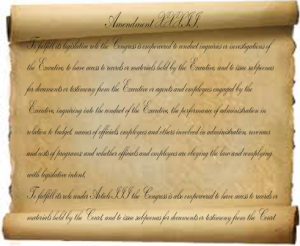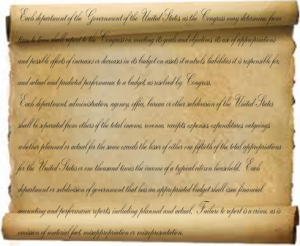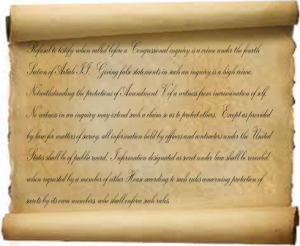Power of Congress to Oversee Government Operations
The purpose of Congressional oversight is to verify that laws passed by Congress are being adhered to, being properly enforced, and whether any improvements to the legislation are needed. Note that this power is not specifically called out in the Constitution, although it should be.
The Supreme Court has ruled that Congress has this power, because the power to legislate includes the power to verify that legislation is actually implemented as intended by the Executive. It may be necessary to clarify the extent of this power and how it consummated.
Executive Over-reach
Complaints of Executive over-reach are really about the President or his administration twisting the intent or express provisions of law to do something other than what the law calls for. Regulations that implement a law are these days written by the Executive branch and then read into the Federal Register to publish them.
Of course, the President has the power to issue orders that clarify laws passed by Congress. Those Executive orders are not supposed to change the intention of a law, nor thwart the enforcement of law, because the President swears to uphold the laws of the United States and to defend the Constitution.
Amnesty via Executive Order
Recently, President Obama refused to enforce the Federal immigration laws by
- Filing lawsuits against state and local police to prevent them from enforcing Federal statutes
- Ordering border patrol officials not to detain certain persons arriving at the border without proper authorization to enter the US
- Ordering the printing and distribution of forms for some of those unauthorized persons to apply for temporary authorization to stay and to work, despite existing laws prohibiting those actions
- In addition, President Obama sent his Justice Department attorneys to threaten state officials with legal action if they refused to issue identification cards or driver licenses to those he “authorized” to stay without visas.
Drafting Federal Regulations for a Federal Law
Administration staffers and lawyers also have the task to write up instructions for Federal officials, designing and publishing any needed forms for gathering information or recording data, and written regulations for filling those forms, processing them and storing them. This regulatory authority is generally written into public laws. Some states specify the exact content of regulations as part of law, not the agency appointed to enforce the law.Hearings Administrative and Civil
In addition to regulatory-drafting authority Federal agencies are also often authorized to conduct administrative hearings for those affected by the regulations. These hearings are intended to supplement individual judgment calls by officials to prevent misapplication of the regulations or the law in processing, basically to assure fairness and justice.
Often these administrative hearings can be appealed into the Federal civil court system (or possibly the criminal side of the courts). Generally, administrative hearings merely enforce the process as detailed in the regulations without referring to the actual written public law.
The civil court on appeal is then faced with trying to judge the intention of the law but as implemented via the regulations. The line between the words in the law and the provisions in the regulations often becomes blurred. The court can side with the more detailed regulatory process as documented, or it can try to read between the lines of actual law to determine what was intended.
The Need to Clarify Oversight into the Constitution
Oversight is hampered when Congress doesn’t have the power to subpoena witnesses and evidence. Moreover, once subpoenaed witness need to be cooperative in order to get the testimony needed to evaluate the implementation of laws.Congressional hearings are not criminal hearings, but a Supreme Court might hold that testimony given in a Congressional hearing could later be used in a criminal proceeding and therefore the 5th Amendment applies.
Constitutionally, an impeachment proceeding is not criminal, since the worst outcome of a successful impeachment hearing is removal from office. Of course, criminal charges might also be pursued later. But, if construction of oversight authorization limits outcome to the same as other impeachment proceedings and restricts the use of evidence gathered in Congressional oversight to at most impeachment, we may be able to compel appearance and to compel testimony under penalty of contempt of Congress.
Amendment XXXII
Provide standing for members of Congress and States to challenge executive actions before the Supreme Court or other such inferior court as Congress may designate. While Amendment XXXII is somewhat lengthy, it does restore Constitutional checks of power against the Executive by the Legislative branch in- Granting the power to inquire into matters of conduct by the Executive with regard to the proper discharge of duties as prescribed by law or the Constitution
- Granting subpoena power by any member of either House over all documents and information held by the Executive or its employees or agents and to enter upon any place over which Congress exercises legislative authority
- Provide penalties for failure to appear or failure to produce, and to provide for removal from office and forfeiture of pay and pension, and disqualification to hold office as prescribed in Article I Section 3
- Granting the power to review and to approve only by affirmative roll-call vote of at least 2/3 of those present in each House all actions, interpretations, orders and written regulations that implement laws passed by Congress



